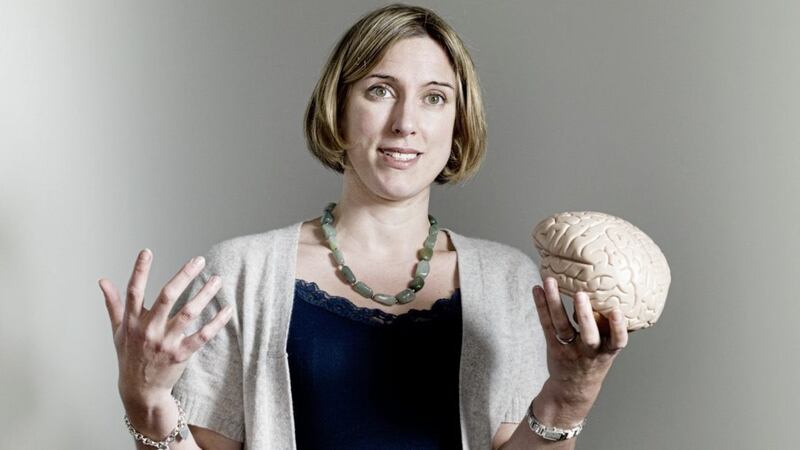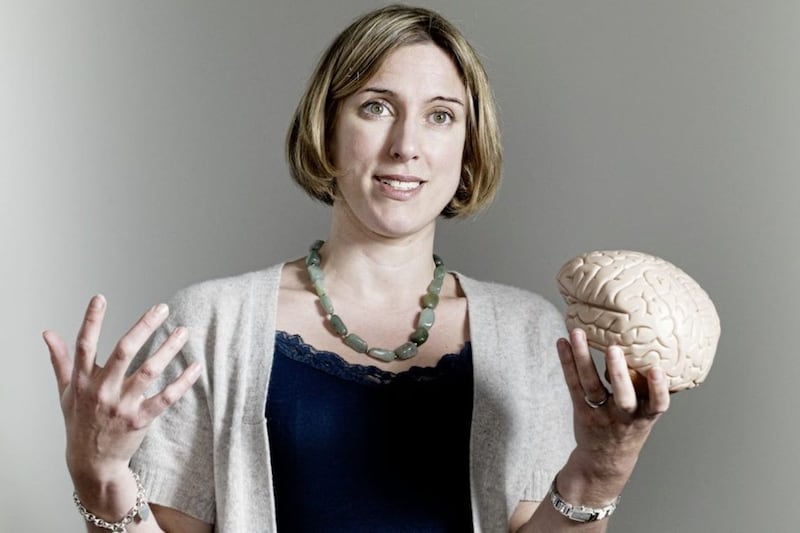WHY does an easy child become a challenging teenager? Why do teenagers struggle to get up in the morning? Rather than be mocked for their moodiness and irrational thinking, award-winning neuroscientist Sarah-Jayne Blakemore has discovered that the need for intense friendships, the excessive risk taking and self-consciousness are largely due to changes happening within the adolescent brain.
"Adolescence isn't an aberration, it's a crucial stage of our becoming individual and social human beings," says Blakemore, ahead of her visit to the NI Science Festival.
Drawing upon cutting-edge research in her London laboratory, Blakemore, a professor in cognitive neuroscience at University College London and author of Inventing Ourselves: The Secret Life of the Teenage Brain, has spent the past 17 years researching young minds.
"I find teenage behaviour fascinating, but not because it's irrational and inexplicable – quite the opposite – it's because it gives us an insight into how natural changes in the psychology of our brain are reflected in the things we do and determine who we will become as adults," adds the 44-year-old.
The overriding finding from her research, which involved MRI scanning to let her look inside the living human brain and track how it functions, was the discovery that the brain continues to develop through adolescence and even into the 20s and 30s.
"Contrary to what I was taught as an undergraduate when I was told the brain stops developing in childhood and changes in behaviour were due to hormones, puberty and social changes, we now know these changes are caused by important neurodevelopmental processes that enable the brain to be moulded and influenced by the environment."
Blakemore dismisses claims that mobile phones and social media are the sole cause of negative teenage behaviour and the growing rate of mental health illness but does support last week's recommendation from the chief medical officer for England, who advised phones should be left 'outside the bedroom' at night.
"It has been estimated that 75 per cent of mental illness first appears before the age of 18. To understand why that is happening and thus prevent it happening we need to have a better understanding of the changes adolescents go through both in terms of biology [their body] and psychology [their brain].
"The changes in the brain mean it's particularly plastic and susceptible to environmental stress," adds Blakemore. These factors could include education, family, friendship, social experiences nutrition, exercise, alcohol and technology.
"If you ask teenagers what are the most stressful thing in your life, the number one answer for many of them is exam and school pressure. We should pay attention to that rather than assuming it's all down to 'iPhones'.
"There is little scientific research yet on the impact of screens on the teenage brain. Teens sneak phones into the bedroom because they feel so driven to social interaction and to respond to their friends, but of course we know sleep is so critical to learning, development and mental health, and I strongly agree they should be banned at night."
As mum to two boys, aged 11 and 13, I ask Blakemore if her research has helped her as a parent?
"Parenting teens can be very stressful as this is the period of life where anxiety and rumination start. I'm a neuroscientist, not a parenting expert, but what I would say is trying to understand what is happening in the brains of teenagers is empowering because it allows you to understand they aren't just being difficult, that these large changes are something they are naturally going through."
She also advises that young people themselves would benefit from knowing the science behind their brain development.
"If you show young people the science behind their powerful feelings, frustrations and embarrassments and demonstrate that these feeling won't last forever, it can help them understand their behaviour and even stabilise it."
Her research also shows that parents should cut teenagers some slack and not nag them for having a lie-in.
"There is a lot of evidence that the circadian rhythms [the body clock], changes around puberty and adolescents are less able to go to sleep early in the evening and find it harder to get up in the morning. That is because melatonin, the sleep-inducing hormone, is produced later at night during adolescence than it is in childhood and adulthood. That means there is a biological reason why teenagers find it hard to get out bed in the morning."
It's not all bad news for teens. While adolescence is a period of vulnerability, it is also a time of enormous creativity – one Blakemore believes should be acknowledged, nurtured and celebrated.
"Due to neuroplasticity, in the teenage years the brain seems to be better able at learning and more creative. Even risk taking and being more passionate isn't always a bad thing."
I couldn't resist but ask her is she would like to be a teen again herself?
"It's a question I've never been asked before. I cannot even imagine being a teenager in today's world," she laughs. "It's so completely different to the world I grew up in. My teenagers couldn't believe I didn't have a mobile phone until I was about 25 and that it didn't have the internet."
:: The Secret Life of the Teenage Brain with Sarah-Jayne Blakemore takes place on February 17 at Belfast's Waterfront Hall, as part of the NI Science Festival. For tickets and full programme details visit Nisciencefestival.com. Her book Inventing Ourselves: The Secret Life of the Teenage Brain, is published by Doubleday and is out now. It is released on paperback on March 21.



